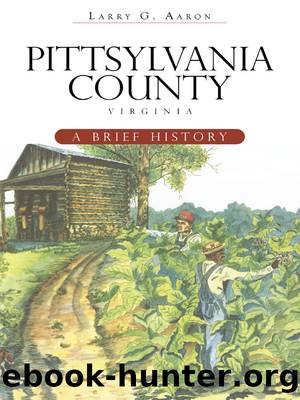Pittsylvania County, Virginia by Larry G. Aaron

Author:Larry G. Aaron
Language: eng
Format: epub
Publisher: Arcadia Publishing Inc.
Published: 2013-03-15T00:00:00+00:00
CHAPTER 9
THE OTHER PITTSYLVANIANS
Pittsylvania is both black and white and has nearly always been so. And regardless of ancestral origins and the pain of the past, Pittsylvania citizens are connected, joined by a common history that began in 1619 when the first cargo of Africans arrived on Americaâs shores.
The rise of Pittsylvania County from the red clay soil of the Piedmont was due primarily to tobacco, but the slaves who tended the tobacco made production and profit possible. While not all families owned slaves and some only a few, slavery was the order of the day during the colonial and antebellum period of the countyâs history.
Haunting reminders of slavery still exist in Pittsylvania County. Remains of slave dwellings and slave graveyards can be found, and structures such as the Richmond and Danville Railroad Bridge were built around 1854 entirely by slaves. Notable plantation houses that dot the county were doubtless largely built with the help of slaves. A significant number of the black population in the county descends from former slaves, with some of their surnames going back to the names of plantation owners.
With the advent of tobacco as a major crop and the importation of slaves to work the land, the slave population in Virginia escalated. Pittsylvania Countyâs first census of tithables showed a white-to-black population of 3:1, but that did not include slave children under sixteen. The slave population increased seven times in the next fifteen years when Pittsylvania County became its present size. From 1790 to 1820, the slave population increased 300 percent, while the white population increased by only 48 percent. By mid-nineteenth century, slaves were 46 percent of the population in Pittsylvania County. According to Karl Bridgesâs statistical study for his masterâs thesis, in 1850 approximately 52 percent of Pittsylvania households owned slaves but only 13 percent of households owned 20 or more slaves. Most slave owners held fewer than 10 slaves. Another source notes that in 1860, on the eve of the Civil War, 1,225 slave owners in Pittsylvania County owned 14,105 slaves.
If slavery was widespread, it was also acceptable. And the Holy Scriptures were offered as supporting evidence that possessing slaves was not only acceptable but also justified. On November 10, 1785, a petition was filed by some well-known citizens of Pittsylvania County to implore the General Assembly of Virginia to reject the crusade to take away slavery:
Gentlemen: When the British Parliament usurped a Right to dispose of our property without our Consent, we dissolved the Union with our Parent State, and established a Constitution and form of Government of our own, that our property might be secure in the future; in Order to effect this we risked our Lives and Fortunes, and waded through Seas of Blood. Divine Providence smiled on our Enterprize, & Crowned it with Success.
The signers insisted that deluded men among them were attempting to dispossess them of a very important part of their property and offered biblical passages for their support. Leviticus 45:44â46 in the Old Testament speaks
Download
This site does not store any files on its server. We only index and link to content provided by other sites. Please contact the content providers to delete copyright contents if any and email us, we'll remove relevant links or contents immediately.
In Cold Blood by Truman Capote(3365)
The Innovators: How a Group of Hackers, Geniuses, and Geeks Created the Digital Revolution by Walter Isaacson(3110)
Steve Jobs by Walter Isaacson(2877)
All the President's Men by Carl Bernstein & Bob Woodward(2357)
Lonely Planet New York City by Lonely Planet(2204)
And the Band Played On by Randy Shilts(2179)
The Room Where It Happened by John Bolton;(2140)
The Poisoner's Handbook by Deborah Blum(2123)
The Innovators by Walter Isaacson(2088)
The Murder of Marilyn Monroe by Jay Margolis(2085)
Lincoln by David Herbert Donald(1976)
A Colony in a Nation by Chris Hayes(1912)
Being George Washington by Beck Glenn(1871)
Under the Banner of Heaven: A Story of Violent Faith by Jon Krakauer(1783)
Amelia Earhart by Doris L. Rich(1680)
The Unsettlers by Mark Sundeen(1674)
Dirt by Bill Buford(1661)
Birdmen by Lawrence Goldstone(1651)
Zeitoun by Dave Eggers(1630)
